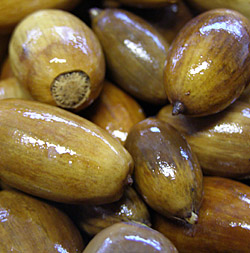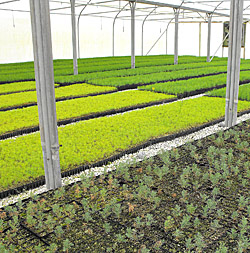Summary
Summary
Trees usually produce good seed crops during mast years, which occur every three or more years depending on species. This results in potential supply and demand problems for seed traders particularly for difficult-to-store seeds such as acorns, chestnuts and maples.
Tree seed lots often contain large quantities of empty seeds, which are sometimes difficult to separate out from filled seeds during processing. This means that some seed lots cannot be machine sown into plug trays, which in turn increases labour costs due to thinning and transplanting in nurseries.
Tree seeds are also often dormant when shed and require stratification to promote rapid, uniform germination over a wide temperature range. This requires experience, skill and good time-management as some species have complicated dormancy mechanisms.

Research objectives
The main objective of this work package are to:
- process, test, stratify and store tree seed lots to improve cost efficiency and effectiveness of nursery plant production;
- detect and where possible eradicate seed-borne pests and pathogens;
- characterise provenances with regard to assisted migration and climate change.
Funders and partners
This work package is largely funded by CFS.
Status
The programme is reviewed at regular intervals.
Forest Research Collaborators
Contact
Forestry Commission policy
This work package contributes to:
2.2.3 – Working towards a sustainable future – Sustainable forest management theme of ‘The Forestry Commission Science and Innovation Strategy for British Forestry 2010-2013’.
- Storage, dormancy, pretreatment and germination of individual tree species
Detailed information for over 100 tree and shrub species - Publications and scientific papers
General Content
Related documents
- Raising Trees and Shrubs from Seed
- Forest Reproductive Material – Regulations controlling seed, cuttings and planting stock for forestry in Great Britain.
